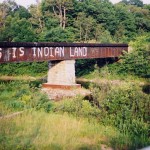
First Nations land not real estate — it's homeland.
from Windspeaker
The House of Commons Finance Committee has recommended the privatization of reserve lands. The suggestion was made when the committee presented its pre-budget report before the holiday break. The committee thinks a policy such as this would help reduce poverty on First Nations.
The idea is not a new one, and has been kicked around for a decade or more and, to some, it hasn’t been well thought out.
The idea was widely presented to the country by Prime Minister Stephen Harpher’s former advisor, Tom Flanagan, in two of his books, ‘First Nations? Second Thoughts’ and ‘Beyond the Indian Act.’ The idea was not very popular in Flanagan’s first book, but he amended the idea to make it more palatable in his second.
And still there are big questions left to answer.
The First Nations community has analyzed the issue. It’s been compared to the 1887 Dawes Act, south of the border. That act resulted in what’s called a ‘checkerboard effect’ where pockets of land within reservations were sold off. Poverty existed there then, and continues to exist in some of our southern neighbors’ communities.
During the debate, columnist Doug Cuthand wrote in the Star Phoenix last fall that some First Nations land is coveted by land speculators, developers and others looking to profit, but not all of the land is so valuable. He argues that lands in remote areas aren’t generally worth a lot.
Cuthand also writes, “Bands that have succeeded in large-scale development are generally closer to urban areas, and those mired in poverty are often far from any commercial centre.”
And then there is legislation in place which accomplishes the same ends that the proponents of land privatization sell in their idea.
The First Nations Lands Management Act (FNLMA) allows community members under the act easier access to mortgages and enables more First Nation control over lands than under the Indian Act.
Chris Angeconeb, director of the Lands Advisory Board Resource Centre (which assists First Nations that have opted into the FNLMA) says, “A First Nations property ownership act would allow for First Nations lands to become fee simple with the underlying title belonging to the First Nation.”
But, he says, there is a problem with that because yet another jurisdiction over land would be created. Angeconeb also says First Nation collective ownership over land is ignored by a land privatization proposal.
That’s not the only problem with the idea. What about treaty rights?
John Rowinski, a lawyer based in Brooklin, Ont., is one of many who have sounded the alarm over the privatization idea. He wrote an article for the magazine Lawyers Weekly back in 2010 saying that the federally proposed idea was “…premature and short-sighted.”
In a January telephone interview, Rowinski pointed out that the issue around treaty rights hasn’t been something he has heard a lot about in the debate. He says, “It’s a huge red flag.
Reserve land is protected in most of Canada by treaty, and those rights don’t run so much with the people so much as they run with the land.”
Rowinski questions, “So if some of that land is sold off or if it’s mortgaged to an outside party, do those rights still apply? What are the tax implications?”
He doesn’t have concrete answers to those questions and it leads to a more challenging discussion.
Rowinski says, “The question now is, are we further dissipating treaty rights and Aboriginal rights — Constitutionally and protected rights — by offering this?
Perhaps the biggest question is, can this be done without a Constitutional amendment?”
“Section 35 protects those Aboriginal and treaty rights and I don’t think there’s been that depth of analysis, at least in the commentary that I have seen on this issue,” Rowinski added.
The issue around treaty and Aboriginal rights within privatization is also difficult for Angeconeb to analyze.
“You have Aboriginal rights outside of reserve lands, and I think the idea that once you privatize ownership of lands, I don’t think you’re going to have the same kinds of …territorial rights happening. So, I don’t think you would have the … ability to say companies have to talk to you outside of your fee-simple lands.”
The most succinct statement about land privatization belongs to Cuthand, who puts it simply: “Indian land is not real estate. It is our homeland, and to privatize it would be disastrous. This land is a legacy from our forefathers and we must turn it over to the next generation.”
© Copyright 2013 SGNews Contributor, All rights Reserved. Written For: StraightGoods.ca
Sorry, the comment form is closed at this time.